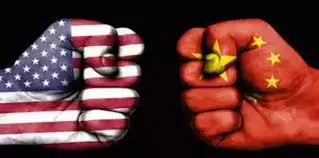This week will be remembered for the organization of the grand G-20 summit under the presidency of India in New Delhi. This summit epitomizes the enthusiasm of the global South, the amalgamation of developed and developing nations, the democratization of international platforms, public participation, inclusivity, and human-centric development. By spreading the messages of ‘Vasudhaiv Kutumbakam’ and ‘One earth, one family, one future,’ India is paving the way for a new chapter in world politics that advocates India’s new mantra to the world: collaborate instead of competing with each other (Is Xi reading this?). After successfully organizing over 200 meetings of representatives from the member and invitee nations of G-20 in over 60 cities, New Delhi is decked up to host the event of the year: the final summit of G-20 under Indian presidency. While this is happening, Prime Minister Narendra Modi also attended the significant Association of Southeast Asian Nations (ASEAN)-India summit in Jakarta this week with a special focus on economic development and an influence-free Indo-Pacific region. He also attended the 18th East Asia summit to boost India’s relations with the East Asian nations. In his address, he emphasized the collective mechanisms between India and the East Asian nations in the security and defense domain to keep the Indo-Pacific stable and neutral.
ASEAN-India: Strengthening collaborative relations
Despite having deep cultural connections with Southeast Asian nations for centuries, and considering that ASEAN was established in 1967, it took many years for both ASEAN and India to develop collaborative and focused relations. When globalization and liberalization reshaped the world after the end of the Cold War in the early ‘90s, India recognized the significance of the region and formulated its ‘Look East Policy.’ ASEAN and India worked diligently to strengthen their political, social, economic, infrastructural, cultural, and security ties. Over time, India transitioned from its ‘Look East Policy’ to the more dynamic ‘Act East Policy.’
This transition has been especially evident in the last nine years. ASEAN and India now engage through more than 30 dialogue mechanisms, collaborating extensively in various domains, often pooling resources through joint funds. India’s focus is on bilateral and multilateral cooperation, fostering co-investment, co-production, and co-development.
India’s vision for co-development in G-20
India is promoting co-development in G-20 too. India has got the presidency of the powerful G-20 for the first time, and it is paving the way for collective welfare for the first time in the history of G-20. The mantra of PM Modi is simple, the benefit of any kind of development should reach the grass-root level. At global level, he has been trying to involve developing as well as underdeveloped nations with the developed ones to ensure collaborative growth. Being the new president of G-20, India believes in ‘inclusive’ progress. On the other hand, PM Modi has a vision not only to fulfil the set objectives of G-20, but he is also committed for ‘democratization’ of all the benefits. The fervour with which agenda of G-20 has been shared with every Indian, it can be clearly seen today how each and every India associates with G-20. Be it the empowered women of the nation, or the youth, or the senior citizens, PM Modi has democratized what was earlier considered as ‘elite’ and ‘intellectual’.
India also democratized the global objectives of G-20 by dividing them under significant sectors. Each sector is mapped to national, state-level, and local programs so that the essence & associated benefits of each sector can be shared with the common man. The world needs to stand together to find the holistic solutions of the challenges posed by Russia-Ukraine war and other geo-political developments in the world.
Russia-Ukraine crisis and multifaceted challenges
Amid the serious challenges posed by Russia-Ukraine crisis, multilateral efforts are being made to not only solve these challenges comprehensively but also to ensure collaborated economic progress at global level. There are multi-folded issues to resolve. If Russia started the war, the US is continuously supporting Ukraine however also suggesting Russia and Ukraine to end the war. NATO is strengthened in past couple of months, but the nations like Britain are facing the brunt of providing aids to Ukraine. Arms race has intensified, along with existing global economic, food and energy related challenges. In East Asia, Japan has announced remilitarization and North Korea is trying to disturb the stability of the region. Indo-Pacific region seems to be another major challenge where the conflict between China and Taiwan has already been internationalized.
Staying together to resolve the perennial issues and moving on is crucial for the world now for it seems to be on the brink of complete economic collapse. Entire world is observing the crisis in nations like Pakistan, Sri Lanka, and China. In such a critical global geo-political situation, India tries to provide the solution. India stands with all groups and lobbies for global good, and has proved its calibre by providing its help to other nations during the testing time of Covid 19 as well.
With a brand image of a dynamic, balanced, and helpful and an inclusive nation, India generates the hope of resolving various global challenges with the support of other likeminded nations. It also calls upon developed and developing nations to collaborate and grow while helping the less-developed nations to come out of the shadow of underdevelopment and join the league of growing economies. Entire credit goes to Indian Prime Minister, Shri Modi for such incredible thought leadership. He has indeed added a new golden chapter in the foreign policy of India as well as in the history of multilateral platforms like G-20 by democratizing global objectives. No wonder, the world will remember Indian presidency of G-20 fondly.
The author is Professor, School of International Studies, JNU























